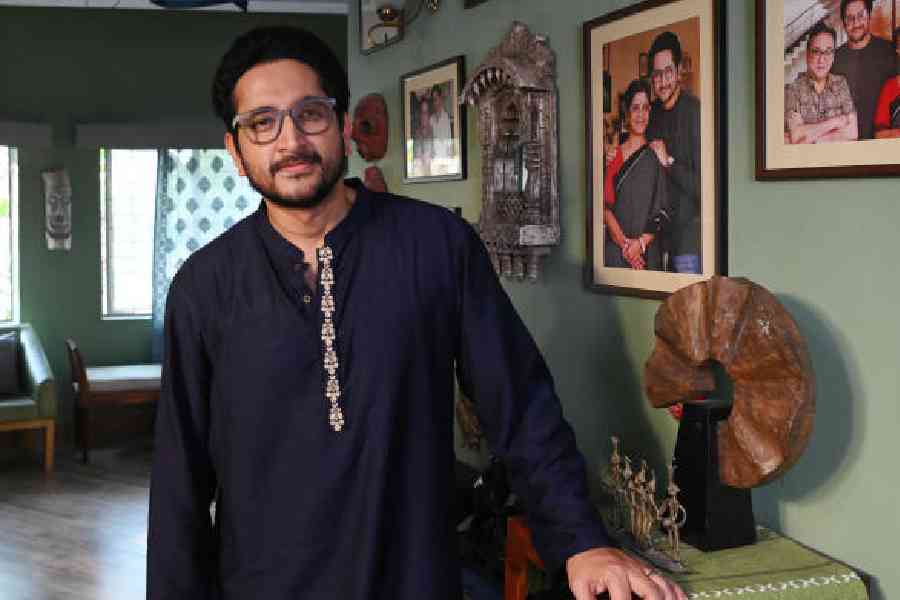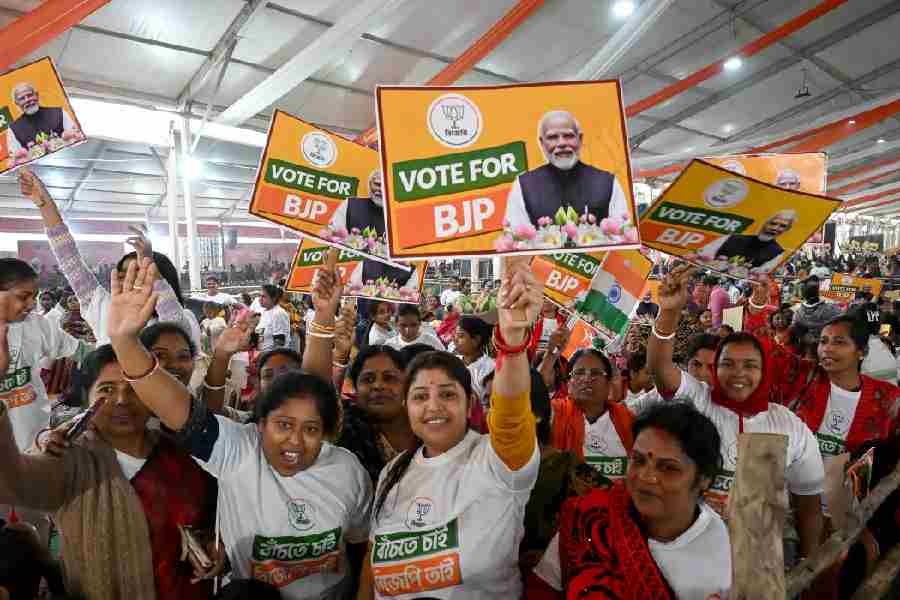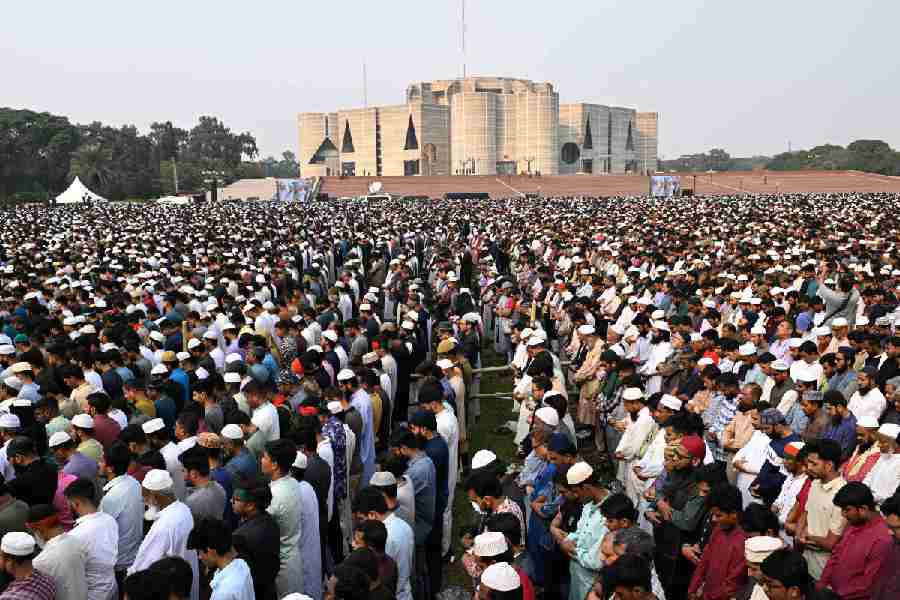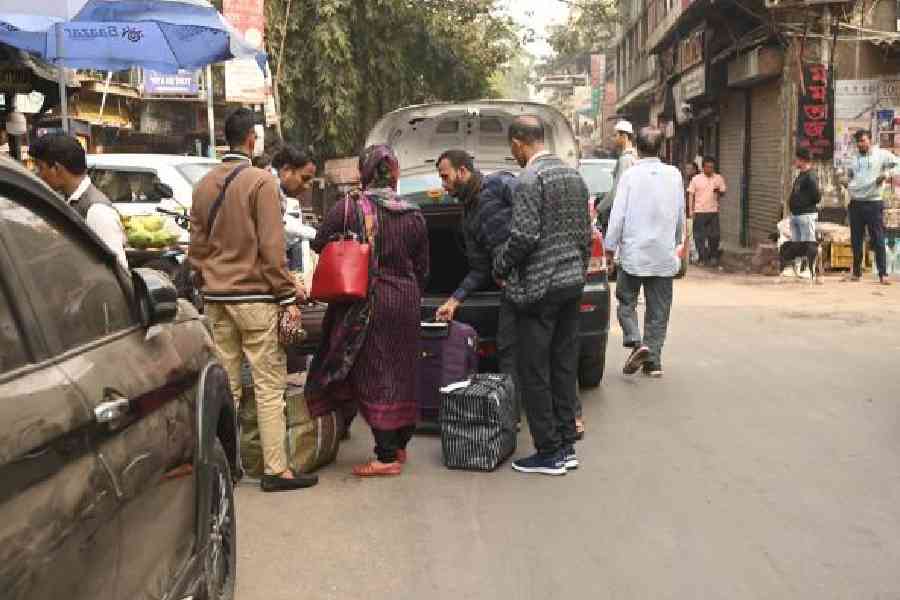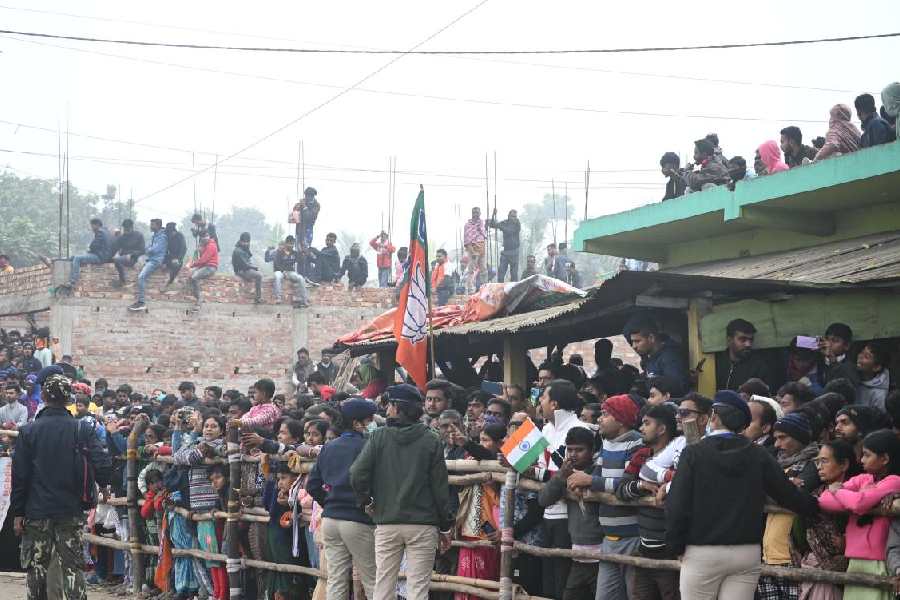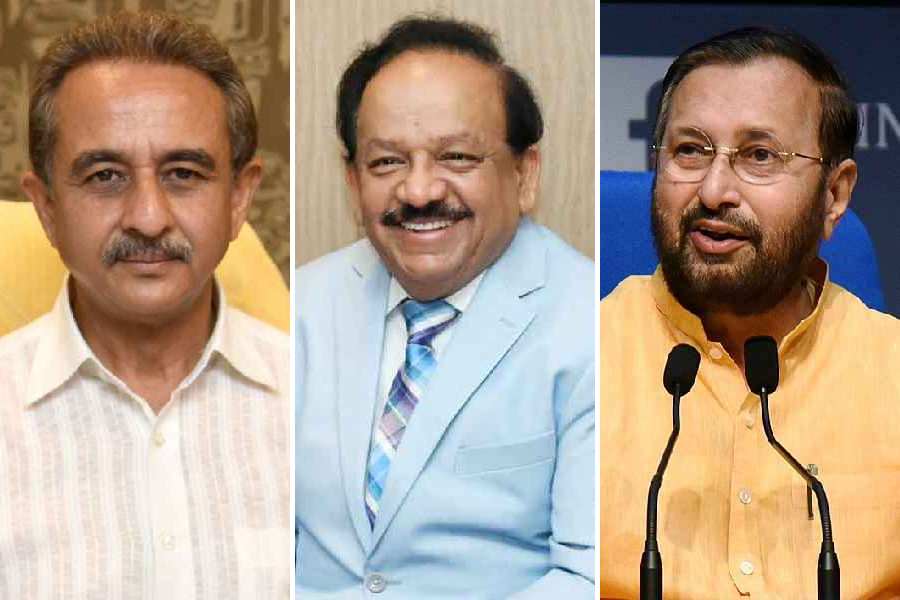The air inside the Lake Gardens house hummed with quiet activity. The living room — warmly lit and arranged with the meticulousness of an upper-middle-class Bengali household — was the heart of the set. Marigold garlands, an aarti plate and sweet boxes scattered on the kitchen top added to the ceremonial feel of the ambience. A polished wooden table stood at the centre, adorned with neatly wrapped gifts, delicate cutlery, and little showpieces that spoke of an old-world charm. The neutral-toned walls filled with family pictures and an open kitchen completed the picture of a well-to-do family home, setting the stage for the scene being filmed that day — an ashirbad ceremony, a moment of familial blessing laden with unspoken tensions.
Upstairs, the shooting was in full swing, while downstairs, in a bedroom set up for brief moments of rest between takes, we caught up with Ishaa Saha. Draped in a red silk sari and flowers adorning her hairdo, she exuded the elegance of her character, yet there was a relaxed ease to her as she settled into conversation. “This is a classic Bengali family drama, but what makes it special is how it captures the generational shifts happening within households. My character is a contemporary woman navigating the expectations of marriage, family, and personal aspirations. She is at that crucial juncture where she is trying to balance tradition with her own identity. In many ways, this story mirrors the dilemmas that a lot of women face today — whether it’s adjusting to a new family, standing up for oneself, or even redefining what being a wife or daughter-in-law means. What I love about this script is that it doesn’t simplify these struggles. There’s no extreme rebellion or submission; instead, it’s about real, everyday negotiations that shape relationships. And yes, the aesthetic of my character — simple yet elegant — fits perfectly into this world of understated conflicts and everyday emotions. It’s refreshing to see a film that doesn’t resort to clichés but instead shows the quiet yet powerful shifts in family dynamics,” said Ishaa.
Parambrata Chattopadhyay, dressed in a simple midnight blue and beige kurta-pyjama, said, “There’s been a sea change in the way people view relationships, marriage, and life choices in our generation as compared to our parents’. Earlier, life followed a set pattern — you married young, had children at a certain age, and followed an established roadmap. But today, those notions are constantly evolving. People are questioning societal expectations, prioritising personal growth, and making unconventional choices. This film beautifully captures the friction that arises from these shifts — not in a dramatic, over-the-top way, but through the small, relatable moments of everyday family life.
“What makes Tejpata unique is that it doesn’t villainise any generation. The older members of the family aren’t controlling for the sake of being rigid, and the younger ones aren’t rebellious just for the sake of defiance. It’s about perspectives, about how love and concern often get tangled with expectations. It’s emotional, sometimes funny, and deeply engaging because every Bengali family, in some way, has lived through these conversations. The script resonates because it’s honest, and that’s what drew me to the film.”
Talking about fatherhood, he said, “There is a lot of excitement and anticipation. We are looking forward to this new chapter with so much happiness and love. It looks like I am busy now because of back-to-back releases. But these are projects that I worked on throughout last year, so I am always occupied. Especially in the last few years, direction and storytelling have taken up a major chunk of my head space, and that is a conscious choice. While I have been choosing distinctive roles, sometimes it is nice to be a part of a sweet and light project like Tejpata. I know Sauvik from his editing days, and Ishaa is a dear friend to Piya and me.”
Director Sauvik Kundu, whose last project was Boomerang, reflected on what drew him to the story. “I’ve always been fascinated by the complexities of family dynamics. The idea for this story didn’t come from a single incident but rather from watching families around me, including my own. The push and pull between generations — the well-intended but sometimes misplaced concerns of elders, the quiet rebellion of the younger generation, and the inescapable emotional ties that hold it all together — this is what makes the film real. I wanted to tell a story that feels intimate yet universally relatable. And, of course, I wanted to wrap it in humour and warmth because, at the end of the day, despite all differences, family is family.” Clearing our curiosity around the title, he said, “You know how if tejpata (bay leaf) does not go into a certain dish and it feels incomplete? This film is about similar topics in a familial situation which must be addressed to keep the bond intact. Tejpata symbolises all those conversations that must be done.”
“Tejpata is a touching tale of love, family, and changing relationships. Starring Parambrata Chattopadhyay, Ishaa Saha, and Laboni Sarkar, it beautifully blends personal dreams with societal expectations. Symbolising life’s subtle yet powerful influences, Tejpata aligns with Zee Bangla Cinema’s Hok Na Ektu Magic,” said Jalaluddin Mondal, chief channel officer, Zee Bangla Cinema & Zee Biskope.
As the scene resumed upstairs, the actors slipped seamlessly back into character. The ashirbad moment felt less like a performance and more like a glimpse into a real family’s life. The warmth of the living room, the carefully curated set pieces, the stolen glances between family members — all of it worked together to create a world that felt lived-in and familiar.
Tejpata promises to be a film that doesn’t just tell a story but makes its audience feel as though they are part of it, sitting at that very dining table, caught in the intricate dance of love, expectations, and quiet defiance that defines every family. It is set to be humorous, light and impactful.
Sanjali Brahma
Pictures: B Halder

